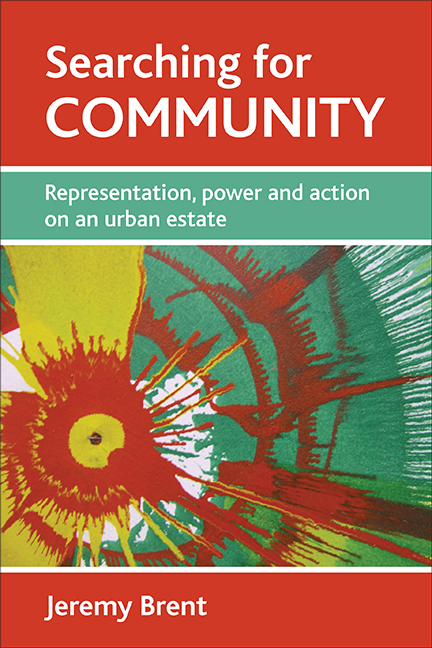Book contents
- Frontmatter
- Contents
- Foreword
- Notes on the author
- Introduction
- one Four settings: contexts and questions
- two Researching Southmead: problems of representation and participation
- three The intelligent outsider? Official and media representations of Southmead
- four Knowledge from within: community art and local representations
- five The outsider within: crossing worlds
- six Young people and community: trouble and tribes
- seven Four examples of community action in Southmead
- eight What is community anyway?
- nine Engaging with community
- ten Communicating what youth work achieves: the smile and the arch
- Author’s acknowledgements
- Epilogue: Southmead eight years on
- Afterword: Why Jeremy Brent’s work is more relevant than ever
- Bibliography
- Index
Afterword: Why Jeremy Brent’s work is more relevant than ever
Published online by Cambridge University Press: 22 January 2022
- Frontmatter
- Contents
- Foreword
- Notes on the author
- Introduction
- one Four settings: contexts and questions
- two Researching Southmead: problems of representation and participation
- three The intelligent outsider? Official and media representations of Southmead
- four Knowledge from within: community art and local representations
- five The outsider within: crossing worlds
- six Young people and community: trouble and tribes
- seven Four examples of community action in Southmead
- eight What is community anyway?
- nine Engaging with community
- ten Communicating what youth work achieves: the smile and the arch
- Author’s acknowledgements
- Epilogue: Southmead eight years on
- Afterword: Why Jeremy Brent’s work is more relevant than ever
- Bibliography
- Index
Summary
Unlike Richard Johnson, my acquaintance with Jeremy was tantalisingly brief. Some five years ago, I worked with a team of colleagues based at the University of the West of England, exploring the varying ways in which community and youth workers and related staff were identifying and addressing the dilemmas that were increasingly emerging in their professional roles. Jeremy agreed to participate in the research. This included individual interviews, action learning groups and a final workshop, bringing participants from each case study area together, to reflect on the emerging findings and their implications for policy and practice. I had been deeply impressed with the transcripts of Jeremy's interviews, so I was very much looking forward to meeting him in person, at this final session.
In the event, that final session was scheduled for 7 July 2005, an illfated date as it turned out, as the bombings disrupted travel to London – an ironic reminder of the wider context for community and youth work in contemporary Britain. But the meeting was rescheduled, and Jeremy contributed to the discussions in ways that were so evidently characteristic of his approach more generally: outstandingly reflective, constructively critical, gently humorous and personally modest. I remember that we remarked on this appreciatively as a team, afterwards, as we digested the session's implications for the conclusions to our research. It was precisely because Jeremy's own research had succeeded in being so reflective and yet so engaged, I think, that he was able to provide such valuable insights, linking the local with the wider material and cultural contexts, as Richard has already illustrated. While the research was rooted in Southmead, the issues and tensions that he explored had immediate relevance for the ethical dilemmas facing professionals with increasing intensity in the current policy framework.
Community and youth work has traditionally involved competing pressures and professional dilemmas. In the workshop, we had identified the continuing relevance of In and against the state, exploring the tensions inherent in the role some 30 years previously. Community and youth workers continue to play these balancing roles, needing to demonstrate flexibility while retaining their ethical principles, enabling subordinated groups to find their agency and voice while maintaining an appropriate degree of critical detachment, neither idealising young people and disadvantaged communities nor simply acting as the agent of an increasingly regulatory state.
- Type
- Chapter
- Information
- Searching for CommunityRepresentation, Power and Action on an Urban Estate, pp. 275 - 278Publisher: Bristol University PressPrint publication year: 2009



